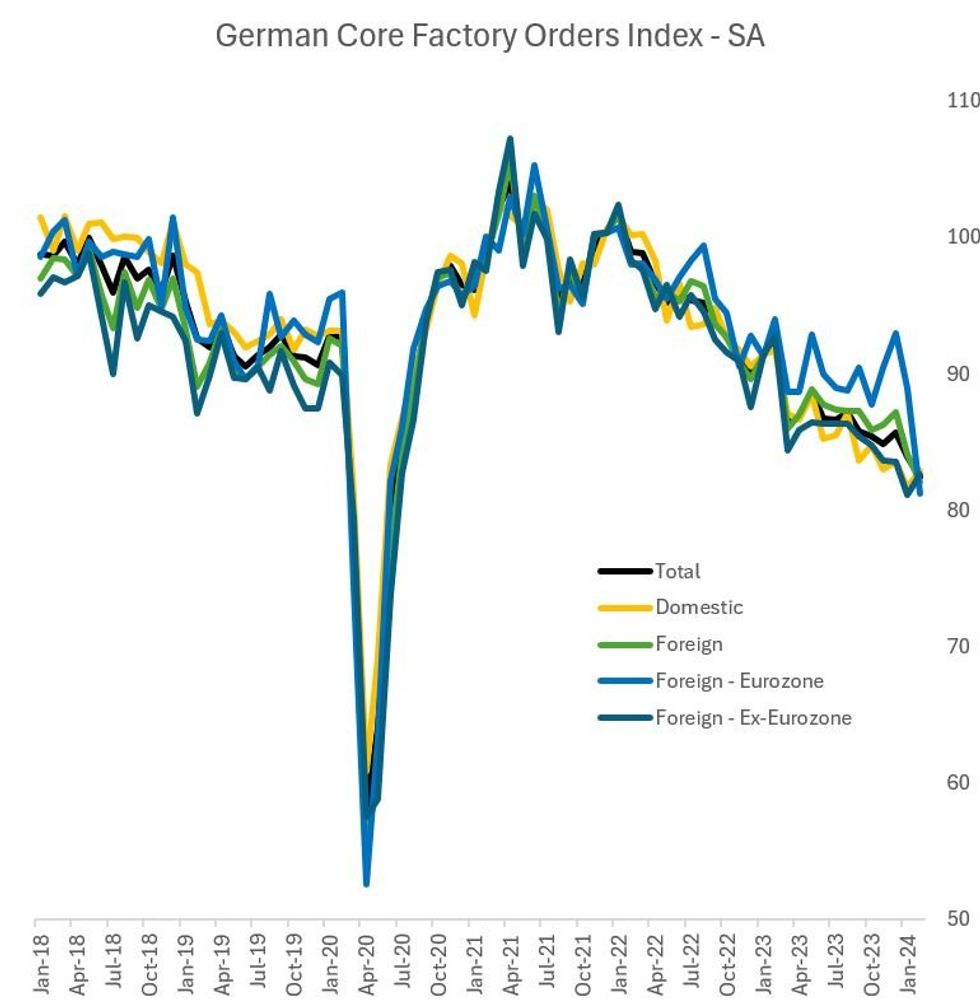-
Policy
Policy
Exclusive interviews with leading policymakers that convey the true policy message that impacts markets.
LATEST FROM POLICY: -
EM Policy
EM Policy
Exclusive interviews with leading policymakers that convey the true policy message that impacts markets.
LATEST FROM EM POLICY: -
G10 Markets
G10 Markets
Real-time insight on key fixed income and fx markets.
Launch MNI PodcastsFixed IncomeFI Markets AnalysisCentral Bank PreviewsFI PiFixed Income Technical AnalysisUS$ Credit Supply PipelineGilt Week AheadGlobal IssuanceEurozoneUKUSDeep DiveGlobal Issuance CalendarsEZ/UK Bond Auction CalendarEZ/UK T-bill Auction CalendarUS Treasury Auction CalendarPolitical RiskMNI Political Risk AnalysisMNI Political Risk - US Daily BriefMNI Political Risk - The week AheadElection Previews -
Emerging Markets
Emerging Markets
Real-time insight of emerging markets in CEMEA, Asia and LatAm region
-
Commodities
-
Credit
Credit
Real time insight of credit markets
-
Data
-
Global Macro
Global Macro
Actionable insight on monetary policy, balance sheet and inflation with focus on global issuance. Analysis on key political risk impacting the global markets.
Global MacroDM Central Bank PreviewsDM Central Bank ReviewsEM Central Bank PreviewsEM Central Bank ReviewsBalance Sheet AnalysisData AnalysisEurozone DataUK DataUS DataAPAC DataInflation InsightEmployment InsightGlobal IssuanceEurozoneUKUSDeep DiveGlobal Issuance Calendars EZ/UK Bond Auction Calendar EZ/UK T-bill Auction Calendar US Treasury Auction Calendar Global Macro Weekly -
About Us
To read the full story
Sign up now for free trial access to this content.
Please enter your details below.
Why MNI
MNI is the leading provider
of intelligence and analysis on the Global Fixed Income, Foreign Exchange and Energy markets. We use an innovative combination of real-time analysis, deep fundamental research and journalism to provide unique and actionable insights for traders and investors. Our "All signal, no noise" approach drives an intelligence service that is succinct and timely, which is highly regarded by our time constrained client base.Our Head Office is in London with offices in Chicago, Washington and Beijing, as well as an on the ground presence in other major financial centres across the world.
Real-time Actionable Insight
Get the latest on Central Bank Policy and FX & FI Markets to help inform both your strategic and tactical decision-making.
Free AccessPlummeting Euro Core Factory Orders Cast Doubt On Recovery
- Core (ex-large ticket items) orders, a better measure of underlying activity, fell by 0.8% M/M after -3.0% in January - the 5th contraction in 6 months. The breakdown showed domestic core orders actually fairly robust at +1.5%, the biggest gain in 6 months (-2.3% prior). Instead it was foreign orders that dragged down the overall index, falling by 2.4% M/M after -3.6% in January. Eurozone orders led the drop, plummeting by 8.8% M/M, after -4.3% in January (foreign ex-Eurozone orders actually rose for the first time in 9 months).
- Outside of the early pandemic months of 2020, this was the biggest single-month fall in core Eurozone factory orders since at least 2010. Overall (non-core) new orders from the Eurozone fell 13.1% (after -24.3% in Jan), with total ex-euro up 7.8% and domestic up 1.5%.
- It's unclear what spurred this drop, particularly as eurozone-wide surveys suggest a nascent rebound in demand and industrial production in 1Q 2024. While the drop in overall orders is clearly linked to a pullback in capital goods orders after a surge in December on a one-off contract, the core decline will be concerning if not reversed in the months ahead.
- Manufacturing turnover rose 2.2% M/M, vs -5.2% in January - the latter of which reflects major revisions from -2.0% prior (autos and machinery/equipment saw large revisions). While there is no consensus for this figure, it could underpin expectations for continued growth in industrial production in Monday's release (currently +0.5% M/M expected vs +1.0% in Jan).
- Overall though there is no convincing sign of a turnaround in German factory activity, with the manufacturing PMI falling to a 5-month low in February and the March EC manufacturing confidence survey plumbing the lowest levels since the pandemic.
 Source: Destatis, MNI
Source: Destatis, MNI
To read the full story
Sign up now for free trial access to this content.
Please enter your details below.
Why MNI
MNI is the leading provider
of intelligence and analysis on the Global Fixed Income, Foreign Exchange and Energy markets. We use an innovative combination of real-time analysis, deep fundamental research and journalism to provide unique and actionable insights for traders and investors. Our "All signal, no noise" approach drives an intelligence service that is succinct and timely, which is highly regarded by our time constrained client base.Our Head Office is in London with offices in Chicago, Washington and Beijing, as well as an on the ground presence in other major financial centres across the world.
